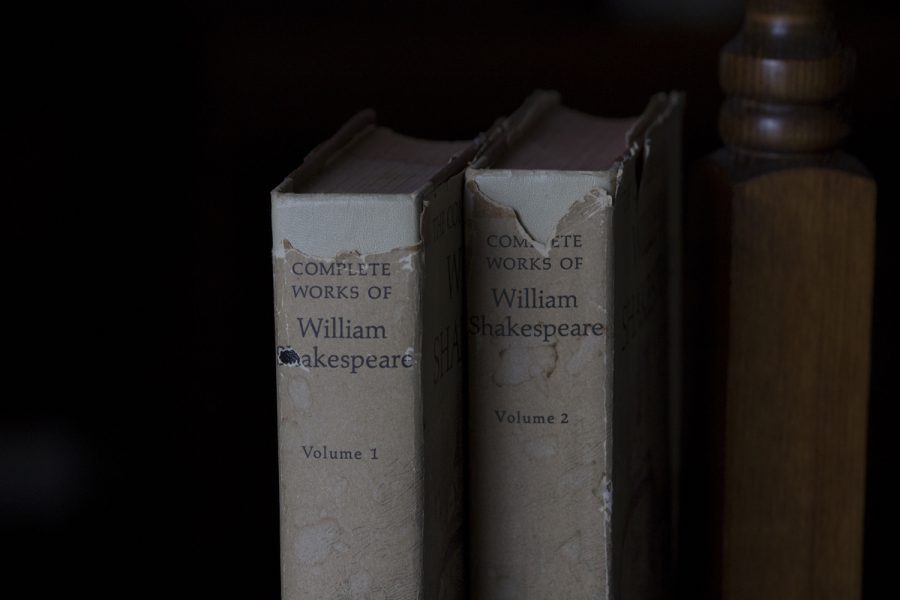Riverside Theatre to celebrate Shakespeare’s birth month with ‘The Sonnet Project’
Riverside has partnered with Iowa City arts organizations to bring poetry readings, writing workshops, a youth writing contest, a full-length production, and a film screening to the community this month, all centered around sonnets.
Stock image.
April 1, 2021
In April of 1564, William Shakespeare was born. To celebrate the birthday of one of the theater’s most popular playwrights, Riverside Theatre, in cooperation with other Iowa City arts organizations, will host a month-long series of events throughout April revolving around Shakespeare’s sonnets.
Titled, “The Sonnet Project,” the series involves a mix of in-person outdoor events and virtual events. Riverside will partner with Iowa City Poetry, Prompt Press, UNESCO City of Literature, and FilmScene to hold readings of Shakespeare’s sonnets, a movie showing, generative writing workshops, and a sonnet competition. Riverside will also film a full-length production of Sonnets for an Old Century for virtual viewing on April 9-18.
Producing Artistic Director for Riverside Theatre Adam Knight noted the importance of Riverside’s collaboration with other local organizations to expand their community.
“We made a decision that Riverside needed to focus on community during this time. This was an opportunity with spring coming, with the vaccines finally being rolled out, to engage a lot of partners,” Knight said. “A lot of our planning process was ‘who can we work with?’ We wanted to find ways to expand who Riverside’s community is.”
One of the main goals of The Sonnet Project is to present the sonnet as a living literary form, Knight said, explaining that Riverside tackles this in their partnership with Iowa City Poetry and Prompt Press to host two generative writing workshops, one for young people on April 11 and one for adults on April 18. In these workshops, attendees will look at contemporary sonnets and compose their own sonnets.
RELATED: Riverside’s ‘Will Power’ reimagined for virtual classrooms
Lisa Roberts, founding director of Iowa City Poetry, explained that the sonnet has come alive in recent years because new writers are taking the literary form and making it their own.
“Essentially, there’s been this renaissance going on in the sonnet in the past couple of decades,” she said. “Americans have rediscovered the sonnet and I really do believe that it has to do with how many new, vibrant voices there are in writing: BIPOC writers, women writers, LGBTQ writers, writers who are immigrants. It’s like they’re able to say, ‘This is my tradition too. I get to write in this literary tradition, and I get to take it and remake it, reform it, and claim it as my own.’”
Riverside will also sponsor a sonnet contest where teenagers can submit their original sonnets.
Along with the generative writing workshops, there will also be a marathon reading of all 154 of Shakespeare’s sonnets outside on the Ped Mall on April 23, in partnership with UNESCO City of Literature, along with 20 virtual performances of Shakespeare’s sonnets, which will be available through Facebook and other internet platforms starting April 5.
The marathon reading will feature some of Shakespeare’s sonnets read in Spanish and the virtual performances will highlight a variety of languages.
UI Spanish professor Ana Merino, who is reading Sonnet 36 in Spanish for the virtual performance series, said that translations help humans understand one another.
“Communication is part of humankind. The way that a translation brings ideas from other languages is key to understanding each other,” Merino said. “Iowa is a writing place and there is the International Writing Program so there is a big tradition of many languages in dialogue with creativity. So, a very nice way to honor Shakespeare is to bring Shakespeare to other languages. We can celebrate his sense and his projection, even in other languages, in a very beautiful way.”
The Sonnet Project will wrap up with a free in-person showing of Ten Things I Hate About You, in partnership with FilmScene, at Big Grove Brewery on April 27.
Knight said that Riverside wanted to focus on the sonnet to educate people about the ways that they can use the sonnet in their modern lives.
“There is an aim of reinforcing the fact that this is a living form, that the sonnet did not rise and die with Shakespeare,” Knight said. “He was picking up a form that already existed and making it his own and now that is the task that we have as humans in this moment. The sonnet is something that can live for us as well.”




